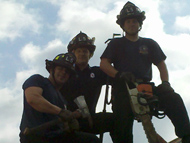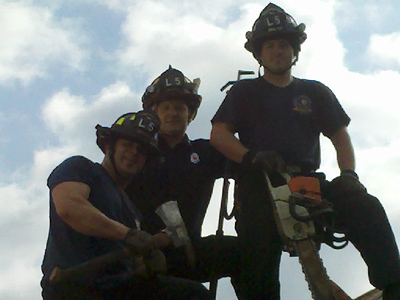
By Anne Gagliano
Resilience is the ability to respond to adversity in such a way as to not only come through it unharmed but to become even better from the experience. Firefighters are resilient; they have to be. They have that unique quality of character that allows them to face danger with courage and patience; they view a crisis as a challenge and endure harrowing life experiences with a sense of pride. Firefighters rebound from misfortune and hardships and trauma with a tenacity of spirit that leaves the rest of us in awe. They accept emotional trauma as the cost of doing business. Firefighters spring back into shape, recover strength, ready to go “once more unto the breach” shift after shift, year after year.
Psychologists today have changed their emphasis of study. Instead of focusing on what makes people mentally ill, they are investigating what makes people able to survive adversity and actually grow from it, and they are calling this study “resilience.” They most often look to firefighters as prime subjects, for the fire department has resiliency built into its very core. What they are finding is that resilience isn’t a quality you are born with; it’s something that can be learned, and the fire department recognized this long before psychologists did.
When human beings experience trauma, they can develop post-traumatic stress disorder, or PTSD. PTSD is a debilitating nervous disorder that renders one nearly dysfunctional. It can happen to anyone at any time. It rarely occurs in firefighters. Why is that? Firefighters witness trauma nearly every shift. But they not only handle it, they get better with age, stronger with experience. Why?
Countless studies show that there are two primary reasons firefighters cope so well with trauma: One is having the front-line support of their crew, and two is having the caring support of loved ones. In this regard, firefighters are doubly blessed by having two families: the one at home and the one at the station. Firefighters rarely consult professional psychologists, for they get better counsel from senior crew members. The older ones help the rookies cope better than anyone else ever could because they’ve literally “been there, done that.” And family support is proven to be the most effective deterrent of depressive disorders. So families, never underestimate your value.
Unfortunately, however, PTSD does occasionally make its way into the fire service. Some firefighters are more vulnerable than others. Who are the vulnerable? Estimates are that 40 to 80 percent of people with PTSD also suffer from clinical depression.1 The clinically depressed firefighter will not seek out other firefighters after a tough run; they tend to be too hopeless to bother. And who is most likely to be clinically depressed? The one whose home life has crumbled from either a death or a divorce. A firefighter named “Mickey” was found wandering in circles and crying in the parking lot of his fire station after a third consecutive traumatic run. He was going through a divorce and failed to tell his co-workers; the cumulative stress proved to be too much for him. I know of another incidence where a firefighter’s spouse was terminally ill; he chose not to tell anyone, and the entire station was impacted as a result. Are we seeing the co-relation to home life and professional life? Healthy family support is crucial to a firefighter’s coping ability.
Other factors that predispose firefighters to PTSD are alienation or isolation, extreme pride or perfectionism, insecurity, dissatisfaction with the job, distrust of the crew, using denial as a coping mechanism, and poor self-control. Alcohol and drug abuse are also major contributing factors to mental instability and, unfortunately, are often used in an attempt by the already more vulnerable to self-medicate stress rather than to seek healthier outlets.
So how does the fire department help its members, all of its members, not just the vulnerable, to be resilient? Trauma is ongoing, and firefighters must face it for their entire career. The leaders must be committed to debriefing procedures in which they are well prepared and well trained. This can be done in any organization, from the smallest of volunteer to the biggest of paid departments. It simply begins with communication. Veterans, keep your eye on the rookies. After a tough run, talk to them about it. It is normal to be emotional; tell them so. Firefighters identify incidents resulting in the death of children or fellow firefighters as being the most traumatic; be aware of that fact and have a protocol in place for them. Tell your crew it’s okay to cry, and if others hassle you about crying, tell them to “pound sand.”
Resilience can be learned. Teach your people to stay calm under stress, for it’s hard to be emotionally calm if you’re a hot reactor physically; emotions and actions can spiral out of control simultaneously. Type A, physically aggressive, hard- driving firefighters can learn to be Type B emotionally when handling a crisis: unruffled, relaxed, and easygoing. The best way to teach this behavioral control is to break the myths that a firefighter must always be in control of both the situation and emotions; that he must always succeed and must never expose a weakness. Firefighters are take-charge problem solvers by nature, so use this strength when discussing emotional issues; tell them the problem will be solved more quickly, head-on, if it is exposed, if they will risk expressing their feelings. Those who talk will heal better than those who don’t.
The same is true at home: Families can’t relate professionally (unless they, too, are firefighters), but they can recognize other behaviors, such as irritability and sleeplessness. Wives, ask your firefighter what is going on if you witness unusual behavior. Firefighters, be willing to talk about it. With the support of two families, you can “struggle well,” face adversity with success, and overcome any obstacle with confidence. Take as much care of yourself emotionally as you do your equipment, and you will be strengthened by adversity rather than be destroyed by it.
“Every life, at some points, must be tested by adversity. We must face losses we can neither prevent nor reverse, confront threats we can never fully neutralize, and master challenges both sought and assumed. With adversity come sorrow and distress, but from its mastery come strength, character, and resolve.” –Richard Gist
ENDNOTE
1. Kirschman, Ellen, PhD, I Love a Fire Fighter, The Guilford Press, 2004.
Anne Gagliano has been married to Captain Mike Gagliano of the Seattle (WA) Fire Department for 27 years. She and her husband lecture together on building and maintaining a strong marriage.

